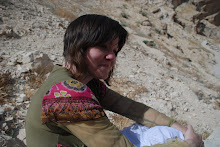Are British law enforcers working in a culture where they routinely associate protest with terrorism? The scene is set by a Guardian investigation that revealed secret C011 databases holding information on "domestic extremists".
Unlike terrorism, defined in the UK by the Terrorism Act 2000, there is no equivalent legal definition for domestic extremism, as the home secretary admitted yesterday. So is domestic extremism merely an "on the hoof" concept devised in a culture deeply suspicious of protest?
The National Extremism Tactical Coordination Unit, Netcu says:
These people and activities usually seek to prevent something from happening or to change legislation or domestic policy, but attempt to do so outside of the normal democratic process.
By their own definition I would regard the setting up of NECTU – an offshoot of an unaccountable private company, the Association of Chief Police Officers – as an example of domestic extremism, as it sits outside the democratic process.
Just as worrying as the world of surveillance databases is the range of anti-terror legislation used to target legitimate protest. The Terrorism Act 2000 has made London a city of "flying checkpoints" a term more commonly used to mean soldiers and jeeps pitching up by the side of a road, stopping vehicles, searching those that pass without reason other then that they are viewed as a security risk.
This power which allows police officers to stop and search any individual, without reasonable suspicion, has been used at protests to intimidate demonstrators.
I believe I came to be labelled a domestic extremist – eventually ending up on a police spotter card – after being stopped under section 44 in the Docklands in 2003 DSEi protests. I was prevented from filming protesters being pulled to the ground by officers as they ran towards the EXCEL centre.
Despite showing my press card, verifiable with Scotland Yard, to the WPC who detained me, I was prevented from going about my business. With the aid of the human rights campaign group Liberty I have been seeking remedy for what I perceive to be wrongful detention. It has taken six years and we still await the European court of human rights's (ECHR) findings.The problem is not just my specific grievance but that the actual legislation is problematic. The police do not have to provide justification for stop and searches under section 44.
When they rejected our appeal the House of Lords advised that if we felt wronged we could seek remedy in the county court. This proved unsatisfactory, as the police are unanswerable for any searches carried out under this legislation so cannot be questioned regarding their motives.
Domestic remedy exhausted, the remaining and costly alternative is the ECHR in Strasbourg. These processes take time and cost vast sums of money making this avenue of redress too expensive for most people to pursue.
So lets unwrap this, section 44 stop and searches can be carried out in any designated area where a special authorisation is in place. In London where many protests are likely to occur the police have carried out more than 150,000 section 44 searches since 2007. At demonstrations police officers, already deeply suspicious of the culture of protest, freely use this legislation. They can use reasonable force to detain someone to carry out the search if the person refuses to comply, they may even refuse to tell the person if a section 44 authorisation is in place, as this may benefit any wannabe terrorists in the area. There is clearly a cultural crisis in the policing of protest.


No comments:
Post a Comment